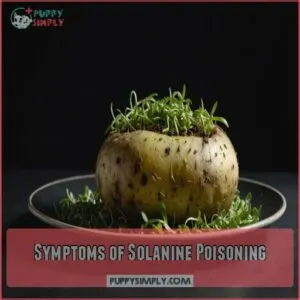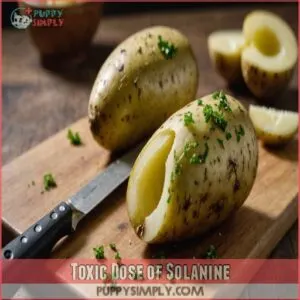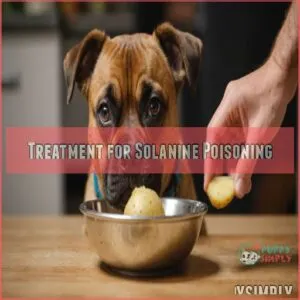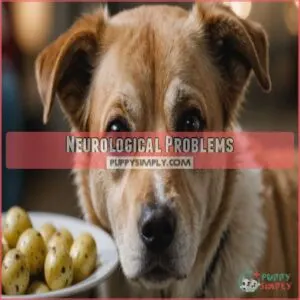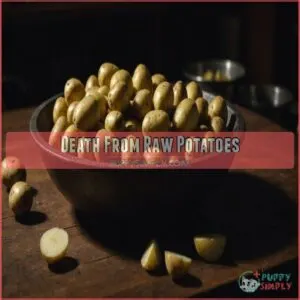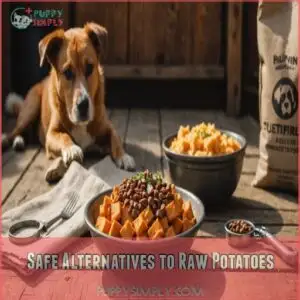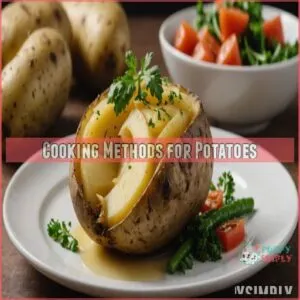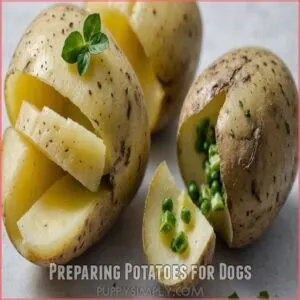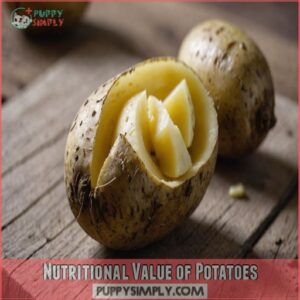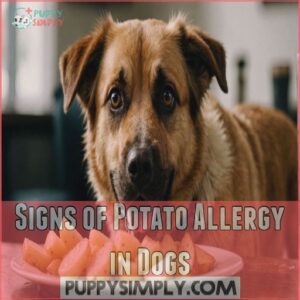This site is supported by our readers. We may earn a commission, at no cost to you, if you purchase through links.
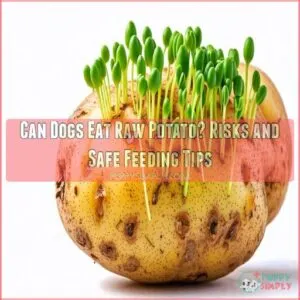
Raw potatoes contain solanine, a toxic compound that can cause serious harm to your furry friend. Imagine a pesky potato on a mission to upset your dog’s stomach, or even worse, cause neurological issues!
It’s best to play it safe and stick to cooked potatoes, but without extra goodies like butter or salt. Want to explore safer alternatives and how to prepare them? Stay tuned for some paw-some tips that follow!
Table Of Contents
- Key Takeaways
- Can Dogs Eat Raw Potatoes
- What is Solanine Toxicity
- Dangers of Raw Potatoes for Dogs
- Safe Alternatives to Raw Potatoes
- Cooking Methods for Potatoes
- Preparing Potatoes for Dogs
- Can Dogs Eat Other Potato Varieties
- Nutritional Value of Potatoes
- Signs of Potato Allergy in Dogs
- Consulting a Veterinarian
- Frequently Asked Questions (FAQs)
- Can dogs eat raw potatoes?
- Can dogs eat green potatoes?
- Can dogs eat baked potatoes?
- Can dogs eat white potatoes?
- What happens if my dog eats raw potatoes?
- How much solanine is toxic to dogs?
- Can dogs eat raw carrots and potatoes?
- Can dogs have red potatoes?
- How can I store potatoes to prevent greening?
- Are mashed potatoes safe for dogs?
- Can potato peels cause harm to dogs?
- Is it safe to feed dogs potato skins?
- What should I do if my dog eats potato chips?
- Conclusion
Key Takeaways
- Raw potatoes contain solanine, a toxin harmful to dogs; never feed them raw potatoes.
- Cooked, plain potatoes (white or sweet) are safe treats in moderation; always remove the skin and any green parts.
- Monitor your dog for allergic reactions like vomiting, diarrhea, or itching after introducing potatoes.
- Consult your veterinarian before adding potatoes or any new food to your dog’s diet, especially if they have existing health issues.
Can Dogs Eat Raw Potatoes
You might think a raw potato is just a crunchy snack, but for your dog, it can be a recipe for tummy trouble.
Packed with the toxic compound solanine, raw potatoes can sneakily cause digestive issues and more serious health risks for your furry friend.
Harmful Effects of Raw Potatoes
Feeding your dog raw potatoes can be safer than giving them cooked chicken bones, which poses significant health risks. Feeding your dog raw potatoes? Think twice! Because of the potential dangers, it’s best to avoid this.
Raw potatoes can cause some serious problems for your furry friend. Here’s what you need to know:
- Digestive upset is common.
- You could see neurological damage.
- There’s even a potential for death.
- Safe alternatives exist, so why risk it?
Toxic Compound in Raw Potatoes
Raw potatoes have a sneaky villain called solanine.
This toxic compound, found in the nightshade family, can lead to potato poisoning in curious canines.
Imagine it’s lurking there, ready to pounce.
Dogs munching on raw potatoes risk digestive troubles and beyond.
So, keep those taters cooked and safe!
| Effect | Description | Emotion |
|---|---|---|
| Nausea | Upset tummy for dogs | Concerned face |
| Confusion | Messes with their mind | Worried brows |
| Restlessness | Can’t sit still | Pacing paws |
| Weakness | Can’t fetch sticks | Droopy paws |
| Vomiting | Messy cleanup | Sigh of despair |
Risks of Feeding Raw Potatoes
Letting your pup nibble on raw potatoes might seem harmless, but think again.
These spuds can be a ticking time bomb for their tummy, churning up stomach upset and even stirring up raw potato toxicity.
If you suspect your dog has ingested toxic potatoes, it’s important to learn more about potato toxicity in dogs.
The issue? While kidney beans can be a nutritious addition to a dog’s diet, including cooked kidney beans for dogs. Solanine levels in green potatoes pose serious dog health risks.
Always prioritize cooked options to keep their little tails wagging safely!
What is Solanine Toxicity
You might think raw potatoes are a harmless snack for your dog, but they contain solanine, a toxic compound that can cause serious health problems.
Understanding solanine toxicity is essential because it can lead to symptoms like vomiting, lethargy, and even neurological issues if your furry friend munches on those forbidden greens.
Symptoms of Solanine Poisoning
Your furry friend got into raw potatoes? Keep an eye out for solanine poisoning, which isn’t fun at all.
You might spot vomiting, diarrhea, weakness, tremors, or even seizures.
It’s a real tummy twister and no walk in the park!
Just like spotting a squirrel, if you see these signs, get help from your vet pronto to make sure Fido’s safety.
Toxic Dose of Solanine
After spotting symptoms of solanine poisoning, you’re probably wondering about the toxic dose.
Solanine levels in potato varieties can vary greatly, especially in green potatoes.
But here’s the kicker: as little as 0.6 mg per pound can cause issues in dogs.
Unlike other toxins that play by different rules, solanine is sneaky.
With some dog breeds being more sensitive, it’s a game of potato Russian roulette!
Treatment for Solanine Poisoning
Spotting solanine poisoning in your dog? It’s time to call for emergency veterinary care.
Here’s the plan:
- Assess Symptoms: Look for signs like vomiting or twitching.
- Activated Charcoal: Your vet might recommend this to absorb toxins.
If your vet is unavailable, you can research solanine poisoning treatment online at Solanine Poisoning Treatment.
- Immediate Response: No home remedies, just swift action for your pup’s safety.
Boom! You’ve got the know-how for a quick response.
Dangers of Raw Potatoes for Dogs
Raw potatoes aren’t your dog’s best friend; they contain solanine, a toxin that can cause tummy troubles and even more serious problems.
Think of it like this: you wouldn’t eat a raw potato, and neither should your furry pal!
Digestive Issues
Feeding your dog raw potatoes could lead to some messy digestive issues, like an upset stomach or diarrhea.
These gastrointestinal problems arise because raw potatoes are tough for dogs to digest and contain high levels of solanine, a toxic compound that can cause vomiting or diarrhea in dogs, as explained in more details about solanine toxicity risks.
Think of their tummies as sensitive washing machines—they don’t handle rough loads well.
To keep Fido comfortable, remember: cooked potatoes are key to avoiding these digestion issues and food sensitivities.
Neurological Problems
Raw potatoes aren’t just tough on a dog’s stomach—they can mess with brain health too, leading to seizures or tremors.
Imagine trying to walk on a wobbly tightrope; that’s how dogs feel with coordination issues.
This nerve damage might seem like a bad movie plot, but it’s a real risk.
Always check with your vet before offering any new food!
Death From Raw Potatoes
So, after the brain takes a hit from raw potato exposure, you might wonder about death from these spuds. Potatoes aren’t joking around! Here’s the lowdown:
- Solanine levels spike: Toxic dose leads to severe potato poisoning.
- Dog safety compromised: Watch for rapid decline.
- Life-threatening risk: Immediate vet attention is a must.
Stay alert; your pup’s life could depend on it!
Safe Alternatives to Raw Potatoes
Regarding avoiding raw potatoes for your pup, you’ve got safer and tastier options right in your pantry.
Try offering them cooked potatoes, sweet potatoes, or even sticking with reliable commercial dog food—your furry friend will thank you for it!
Cooked Potatoes
Sure, cooked potatoes can be a safer alternative for your furry friend.
Picture them as a cozy couch potato—pun intended!
Boiled or baked, these spuds lose that pesky toxin solanine.
Just keep ‘em plain—no butter, oil, or seasonings—and start with small serving sizes to see how they handle it.
Remember, moderation is key to avoid surprises like potato allergies!
Sweet Potatoes
Switching gears from cooked potatoes, you might wonder about sweet potatoes.
These orange delights are tasty and also safer for dogs and loaded with benefits.
- Sweet potato benefits: Rich in fiber and vitamins, great for digestion.
- Sweet potato recipes: Simple baked treats are perfect.
- Beware of sweet potato allergy: Start small and check for reactions.
Commercial Dog Food
Sweet potatoes are a great swap, but let’s be honest, sometimes you just want to know what’s in your pup’s food.
High-quality commercial dog food offers a balanced diet, eliminating guesswork about ingredients.
Check labels for quality, compare brands and costs, and be aware of potential recalls.
It’s peace of mind in a bowl!
Cooking Methods for Potatoes
If you’re looking to prepare potatoes for your furry friend, cooking is your secret weapon to make them safe and tasty.
Whether you choose boiling, baking, or microwaving, you’re on the right path to turning these starchy tubers into a paw-some treat!
Boiling
Boiling potatoes is simple—just drop them in hot water until soft enough to mash with ease.
For a convenient and hassle-free experience, you can also find various dog potato boiling products online, such as those available on dog potato boiling tools.
Keep the water temperature steady and don’t rush the boiling time; a watched pot boils pretty darn fast, but rushing risks uneven potato texture.
Boiling methods can vary, but the key is even cooking for a safe, tasty addition to your dog’s diet.
Baking
Ever thought about baking potatoes for your dog?
It’s a safe option and can add a twist to their diet, but always remember to choose a high-quality ingredient as you’d when selecting high-quality dog food.
Here’s how to get it right:
- Temperature: Preheat your oven to 375°F.
- Time: Bake for about 45 minutes.
- Pan: Use a baking pan to avoid mess.
- Safety: Make sure potatoes are cool before serving.
Microwaving
Microwaving potatoes for your dog might seem quick, but it can be a bit tricky.
The microwave’s heat doesn’t always cook evenly, leaving parts of the potato undercooked.
This uneven cooking can lead to texture issues and potential nutrient loss.
To keep things safe and tasty, stick with boiling or baking.
Your pup deserves the best!
Preparing Potatoes for Dogs
When preparing potatoes for your dog, make sure to remove any green parts and peel the skin to keep them safe and snack-ready.
Just like you wouldn’t want to eat straight from the spice rack, skip the seasonings for your furry friend’s potatoes!
Removing Green Parts
Spotting those sneaky green parts on your potatoes is like finding the villain in a mystery novel—they’re up to no good.
These green areas can bump up solanine levels, posing a threat to your dog’s safety.
Before you let Rover nibble on spuds, make sure to chop away any green spots.
It’s potato safety 101: remove green parts to keep solanine at bay!
Removing Peel or Skin
How thoroughly should you peel those potatoes for your pup?
Removing the potato skin greatly lowers solanine levels, a toxin that can upset your dog’s tummy.
Peeling is easier than scrubbing, but leaving some skin on is okay, just make sure to remove any green bits.
Think of it as a tasty, albeit slightly less nutritious, treat.
Avoiding Seasonings
Seasonings may add zing to our meals, but for dogs, they spell trouble with a capital T.
Here’s why you should avoid seasoning potatoes for dogs
- Potato seasoning dangers: Salt and spices aren’t dog-friendly.
- While dogs can eat plain potatoes, consuming high salt and fat foods like French fries can lead to serious health issues. Onion powder can be toxic.
- Healthy dog treats: Plain is best.
- Safe potato options: Serve without butter or salt.
Play it safe!
Can Dogs Eat Other Potato Varieties
Sure, dogs can eat some potato varieties like white potatoes, but only if they’re cooked without any extras like butter or spices.
You can stick to sweet potatoes too, but remember, raw potatoes are a big no-no!
White Potatoes
Thinking about offering your dog a white potato treat?
Make sure it’s cooked and unseasoned—this spud isn’t toxic once you’ve boiled or baked it.
But don’t give too much; you don’t want a couch potato for a pup!
Remember, moderation is key.
If you notice any odd reactions, like an allergy, call your vet for peace of mind.
Other Potato Varieties
Purple potatoes, Yukon Gold, Fingerling, or Russet might catch your eye, but are they safe for dogs?
Generally, when cooked and unseasoned, they’re okay in moderation.
Watch out, though! Here’s a quick check-list:
- Always peel them.
- Cook until soft.
- Skip seasonings completely.
- Monitor your pup for any reactions.
Curious canine? Keep it safe!
Nutritional Value of Potatoes
When you’re thinking about adding potatoes to your dog’s diet, you should know they’re high in starch but offer little nutritional value.
While potatoes can be a tasty treat, they shouldn’t become the main course since your dog needs a balanced diet for peak health—and that doesn’t come with a side of spuds!
High in Starch
Potatoes are real starchy treats, aren’t they?
But for dogs, that potato starch content can be a bit much.
For a well-rounded meal, consider a high-quality dog food that includes a balanced blend of nutrients, such as Nutro Ultra Toy Breed.
Imagine eating a bowl of plain oatmeal every day—it’s all carbs and not much else.
Dogs need diversity in their diet, not just starch.
Consider the risks of giving your dog spoiled or expired ingredients, including the potential for surviving bacteria like salmonella, and instead consider healthier potato alternatives or well-rounded dog food starch options for better digestion and nutrition.
Keep it real!
Low in Nutritional Value
Your dog’s nutritional needs are super important!
While potatoes are yummy to us, they don’t offer much in the way of essential nutrients for your furry friend.
They’re mostly starch, so they’re not a great source of vitamins or minerals.
Think of them as a very occasional treat, not a meal replacement.
Better to stick with nutrient-rich treats or a complete and balanced dog food for a happy, healthy pup!
Potato alternatives, like carrots or green beans, are much better choices.
Impact on Dog’s Diet
Balancing your dog’s diet is a bit like trying to solve a jigsaw puzzle.
Potatoes pack calories but don’t offer much more in terms of nutritional balance.
They can throw off your dog’s digestive health if given in excess.
Overdoing it might lead to issues akin to adding too many pieces from the wrong puzzle box.
Keep portions in check!
Signs of Potato Allergy in Dogs
Spotting a potato allergy in your furry friend can be as easy as noticing the mad dash to the backyard or the sudden itch-fest.
Keep an eye out for symptoms like vomiting, diarrhea, itching, and lethargy, which might indicate your pup’s not a potato fan.
Vomiting
When your dog eats potatoes and starts vomiting, it could be a sign of a potato allergy.
It’s like their tummy’s throwing a protest rally!
It’s important to remember that food allergies in dogs can cause various symptoms, including vomiting, so it’s best to stop feeding them potatoes and consult your vet.
If you see your furry friend dealing with this, it’s best to stop feeding them potatoes and consult your vet.
If your dog suffers from vomiting, consider a bland diet with boiled chicken and white rice, or try commercial sensitive stomach dog food. Opt for safe treats or homemade dog food instead to keep their stomach.
Diarrhea
Diarrhea is your dog’s messy way of saying, "Potatoes don’t agree with me."
It’s not just about a bad tummy day—potato-induced diarrhea signals a potential allergy.
Keep an eye out for these signs:
- Frequent trips outside
- Loose, watery stools
- General discomfort or restlessness
Spotting these symptoms early helps in prevention and swift treatment, saving your carpet.
Itching
Imagine how annoying flea bites can be; that’s how dogs feel with a potato allergy, leading to skin irritation.
If your furry friend is itching more than usual, it could be food sensitivities.
Here’s a quick look:
| Possible Cause | Reaction |
|---|---|
| Flea Bites | Itching |
| Potato Allergy | Irritation |
| Environmental | Scratching |
| Sensitivities | Redness |
Check with your vet for advice!
Lethargy
If your furry companion seems a bit more sluggish than usual, it might be a sign of potato allergy.
Just like how a cozy couch pulls you in for an unexpected nap, a drop in energy levels could point to health concerns.
Keep an eye on their sleep habits and exercise needs.
Trust your instinct and monitor their overall well-being.
Consulting a Veterinarian
Don’t hesitate to chat with your vet; they’re the potato pros for your dog’s diet.
They can offer personalized advice on safe potato portions and help you spot any potential problems, ensuring your furry friend stays happy and healthy.
Dietary Restrictions
Choosing the right diet for your dog is like steering a ship through tricky waters.
Many dogs develop food sensitivities, so keeping an eye on dietary restrictions is key.
Consult your vet about the potential risks of dilated cardiomyopathy associated with grain-free dog food diets. Consult your vet about any dog food allergies before introducing potential triggers like homemade dog food or human food for dogs.
They’ll help you choose trustworthy dog food brands, ensuring Fido sails safely through mealtime!
Allergic Reactions
Spotting potato allergy symptoms in your dog isn’t like finding a needle in a haystack—it’s more obvious.
Watch for vomiting, diarrhea, or itching.
Identifying food allergies can be tricky, and your vet may use methods like elimination-challenge diets to help narrow down the cause.
They’ll help with allergy testing and guide you on safe dog food choices, including suggesting hypoallergenic dog food.
Remember, an itch in time saves nine!
Monitoring Dog’s Health
Keeping a close eye on your furry friend’s health is like watching a beloved TV show – you can’t miss an episode!
Regular vet visits help catch any food allergies or potato reactions early.
Be alert for signs like digestive problems.
Remember, a happy pup is a healthy pup, so let your vet be the MVP in dog health.
Frequently Asked Questions (FAQs)
Can dogs eat raw potatoes?
Dogs shouldn’t munch on raw potatoes due to solanine, a toxic compound that can cause upset stomach or worse.
Instead, give them small amounts of cooked, unseasoned potatoes as an occasional treat.
Keep your pup safe!
Can dogs eat green potatoes?
Nope, green potatoes are a no-go for your pup! They contain solanine, a toxic compound. Stick to cooked, plain white potatoes in small amounts. Always check with your vet first!
Can dogs eat baked potatoes?
Picture your dog with a chef’s hat—baked potatoes can be fine if plain and thoroughly cooked.
Moderation is key.
Skip the toppings like butter or cheese to help your furry friend’s tummy stay happy and healthy.
Can dogs eat white potatoes?
White potatoes are safe for dogs in moderation if cooked and peeled.
Avoid raw or green parts due to toxic solanine.
Watch for any adverse reactions, and remember, they shouldn’t replace a balanced dog diet.
What happens if my dog eats raw potatoes?
If your dog munches on raw potatoes, like a curious explorer tasting forbidden fruits, it could face tummy trouble.
Raw potatoes contain solanine, which might cause vomiting and diarrhea.
Keep cooked, unseasoned potatoes as their safer treat.
How much solanine is toxic to dogs?
Dogs can show symptoms of solanine toxicity at doses of 2-5 mg per kilogram of body weight.
Watch out for vomiting, diarrhea, and lethargy if your canine friend snacks on raw or green potatoes.
Can dogs eat raw carrots and potatoes?
Raw carrots are a crunchy, healthy snack for dogs, packed with vitamins.
Raw potatoes, though, are a no-go due to solanine, a toxin.
Always cook potatoes first to play it safe with your furry friend!
Can dogs have red potatoes?
Red potatoes? Proceed with caution!
While cooked, peeled red potatoes are okay in small amounts, raw ones contain solanine, a toxin.
Always check with your vet before adding new foods to your pup’s diet.
How can I store potatoes to prevent greening?
Store potatoes in a cool, dark place, like a basement or pantry, to prevent greening.
Keep them in a breathable bag or basket, avoiding plastic.
Light exposure causes solanine, so no sunbathing!
Are mashed potatoes safe for dogs?
Think of mashed potatoes as the friend who means well but isn’t quite right for dogs.
Plain, unseasoned mashed potatoes are okay in small quantities, but too much can upset your dog’s stomach.
Watch for any adverse reactions.
Can potato peels cause harm to dogs?
Potato peels can harm dogs due to solanine, a toxic compound more concentrated in green and raw peels.
Feeding peels may lead to digestive issues.
Always peel and cook potatoes thoroughly before sharing with your furry friend.
Is it safe to feed dogs potato skins?
Despite dogs loving a crunchy snack, potato skins are like a double-edged sword.
They’re loaded with solanine, the sneaky toxin found in nightshades.
Keep it safe—ditch the skins, and stick to plain, cooked potatoes.
What should I do if my dog eats potato chips?
If your dog munches on potato chips, don’t panic.
Keep an eye out for symptoms like diarrhea, vomiting, or excessive thirst.
Too much salt isn’t great for dogs, so contact your vet if you’re worried.
Conclusion
Ever wonder why your dog shouldn’t munch on raw potatoes?
It’s all about keeping them safe from solanine, a nasty toxin in raw potatoes.
It’s like a hidden villain causing tummy troubles or worse.
Instead, try cooked spuds or sweet potatoes—they’re tasty and safe.
A side dish of commercial dog food can’t hurt either.
But before you cook up a potato feast, be sure to chat with your vet to avoid any surprises!


